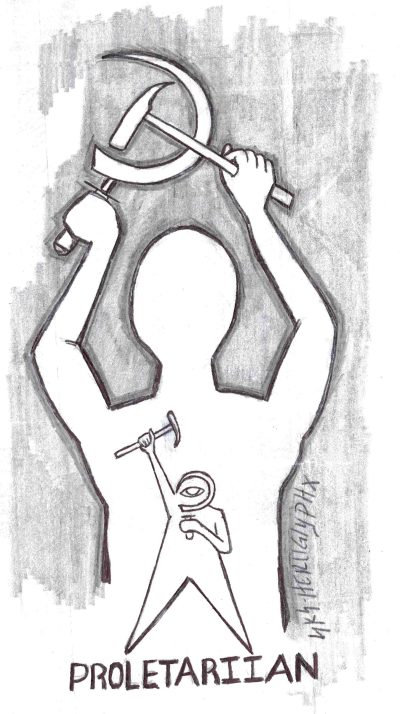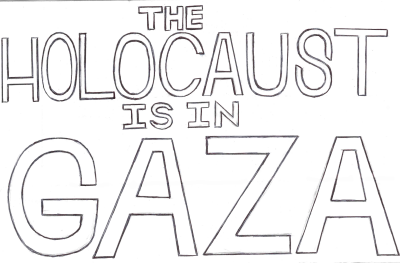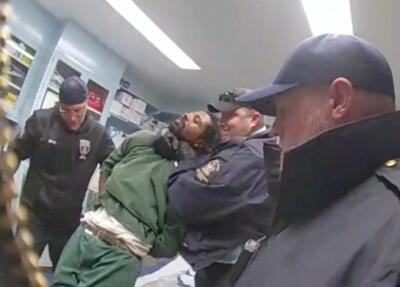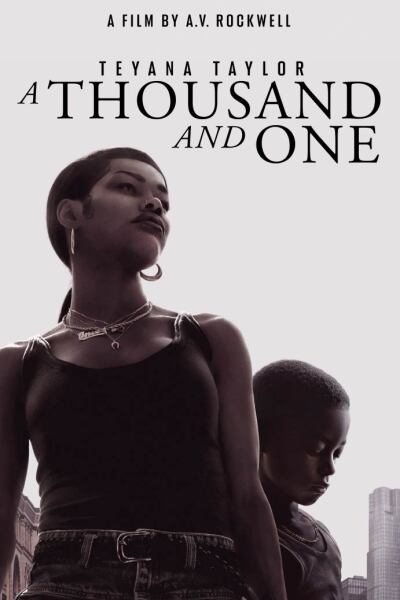
Luigi Mangione: Reaction or Revolution
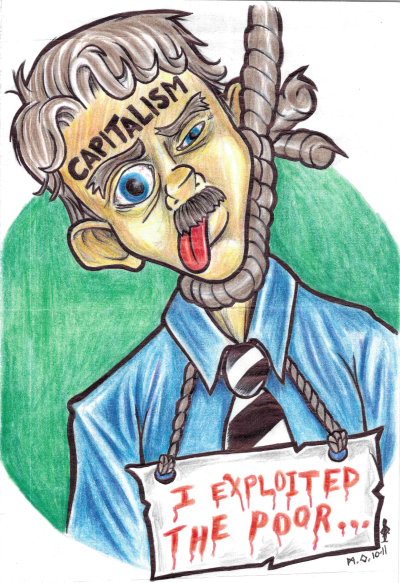
In the early hours of Wednesday, December 4th, a masked gunman shot the CEO of United $tates insurance company UnitedHealthcare, Brian Thompson, to death in the bustling streets of New York City. By midday, CCTV footage of the act had gone viral across the internet and traditional news media, spawning endless narratives and theories. Simultaneously, the high-profile nature of the shooting prompted a national manhunt to search for the suspect. The shooter evaded capture for five days, but ey was eventually arrested after a tip was called in by a McDonald’s employee in rural Pennsylvania.
As communists operating in the United $tates, how are we to understand this event? What does the event itself and its resulting fallout tell us about the political landscape we work within? If we wish to live up to the title of being Marxists, the only answer to these questions is that we must conduct a, as Lenin put it, “concrete analysis of concrete conditions.” Let us begin with the facts of the case.
The Facts
The name of the alleged shooter is Luigi Mangione. As laid out in eir so-called ‘manifesto’, Luigi’s motivation for the shooting is a disdain for U.$. healthcare insurance companies in general and UnitedHealthcare in particular. The origin of this disdain likely lies in a combination of Luigi’s persynal interactions with health insurance companies through eir struggles with back pain as well as the more widespread antagonism between the U.$. population and health insurance companies.
Luigi comes from a well-connected family which has its roots in the suburbs of Baltimore, Maryland. Eir grandfather ran several successful business ventures which guaranteed employment and prosperity for the next generations of the Mangione family as they have now taken the reins on the family businesses. Luigi emself attended a private high school before attending the Ivy League University of Pennsylvania where ey got eir degree in computer science in 2020. According to Luigi’s family and friends, ey ceased all communication with them in July 2024. Presumably, Luigi spent the time between then and December planning the shooting, which we will now focus on.
As mentioned, the shooting itself took place on the morning of 4 December 2024. Interestingly, Luigi employed a 3D-printed firearm to commit the shooting, which marks the first time such a weapon has been used in such a high-profile case. Immediately after, Luigi evaded the swarms of police by traveling via foot, cab, and e-bike before boarding a train towards Philadelphia. Not much else is known about Luigi’s whereabouts and travels during the 5 days between the shooting and eir arrest in Altoona, Pennsylvania.
The biggest takeaway here is how easily Luigi evaded both the NYPD and the FBI for an extended period of time. If Luigi had continued traveling, discarded the evidence ey carried on em, or put any effort into changing eir appearance, it’s likely that ey would have never been caught. But this is simply speculation on our parts. Let us now turn from the objective facts of the case to the realm of ideology.
Luigi’s Ideology
To understand why Luigi Mangione shot Brian Thompson, we must first understand eir ideology. The only clues we have towards this understanding are scattered social media posts as well as the aforementioned “manifesto” Luigi had on em when ey was arrested. While we’ll primarily focus on the “manifesto”, we will first highlight one of Luigi’s social media posts where ey reviews the writings of Ted Kaczynski, also known as the Unabomber. In this review, Luigi highlights how Kaczynski was “rightfully imprisoned” because ey “maimed innocent people” but that these were the actions of an “extreme political revolutionary.” Luigi’s review finishes by quoting multiple paragraphs from a Reddit comment expounding how violence is the only method we have at our disposal to fight back against “our overlords.”
Now, turning to the “manifesto”, we wish to give our readers the fullest picture possible, so we have included below a full copy of the writing that was recovered when Luigi was arrested:
“To the Feds, I’ll keep this short, because I do respect what you do for our country. To save you a lengthy investigation, I state plainly that I wasn’t working with anyone. This was fairly trivial: some elementary social engineering, basic CAD, a lot of patience. The spiral notebook, if present, has some straggling notes and To Do lists that illuminate the gist of it. My tech is pretty locked down because I work in engineering so probably not much info there. I do apologize for any strife of traumas but it had to be done. Frankly, these parasites simply had it coming. A reminder: the US has the #1 most expensive healthcare system in the world, yet we rank roughly #42 in life expectancy. United is the [indecipherable] largest company in the US by market cap, behind only Apple, Google, Walmart. It has grown and grown, but as [sic] our life expectancy? No the reality is, these [indecipherable] have simply gotten too powerful, and they continue to abuse our country for immense profit because the American public has allwed [sic] them to get away with it. Obviously the problem is more complex, but I do not have space, and frankly I do not pretend to be the most qualified person to lay out the full argument. But many have illuminated the corruption and greed (e.g.: Rosenthal, Moore), decades ago and the problems simply remain. It is not an issue of awareness at this point, but clearly power games at play. Evidently I am the first to face it with such brutal honesty.”(1)
Let us take a closer look at this writing. Luigi begins with saying:
“To the Feds, I’ll keep this short, because I do respect what you do for our country.”
To those who proclaim Luigi is spreading “class consciousness” or that ey is a revolutionary, this single sentence should shatter all illusions. If an ally of yours said ey respects federal agents (of the FBI, CIA, etc.) for what they “do for our country,” would you be on eir side? Our answer to this question is a resounding Fuck No.
What else does Luigi write about? Ey brings up some rudimentary statistics about life expectancy in the United $tates and market capitalization before asserting that U.$. corporations have “gotten too powerful” and “they continue to abuse our country for immense profit because the American public has allwed [sic] them to get away with it.” This strikes us as similar to the proposition that the Amerikkkan public is “brainwashed” (how? by whom? why?) into merely passively accepting the capitalist-imperialist world-system. This stands in opposition to our political line which is that Euro-Amerikans actively embrace imperialism (consciously or not) as the primary source of their wealth via super-profits extracted from the Third World proletariat.
Luigi ends eir writing by admitting that ey is not “the most qualified person to lay out the full argument” for the issues of the U.$. health insurance system but assures us that ey is, “evidently […] the first to face it with such brutal honesty.”
How high and mighty! Luigi is “evidently” the first to break through the veil of ignorance which plagues the rest of us. Though we would contend that there are perhaps a few people who have come before Mr. Mangione who have faced the “corruption and greed” of the healthcare industry (which is only a particular form of capitalist industry in general) with “such brutal honesty.” Off the top of our heads, we can think of Marx, Engels, Lenin, Stalin, Mao, Fred Hampton, Malcolm X, or Huey Newton, just to name a few. These are of course only the most popular figureheads of past communist movements. In reality, there are millions who have stood their ground against the imperialist-bourgeoisie and lost their lives for it. But no matter their sacrifice, for we have been blessed with the gift of the wealthy Euro-Amerikan from Maryland showing us the path forward!
So where does all this leave us? Is Luigi really a Marxist revolutionary who has been sent down from the Heavens to end the oppression of the masses? Of course not. Luigi’s writings and musings are nothing more than regurgitations of the same social fascist populism that is reminiscent of the messaging around Bernie Sander’s presidential campaigns combined with an impetus towards political violence. Discontent with the healthcare insurance industry is normal everyday politics for people living in the United $tates. All Luigi did was elevate this discontent from the level of complaining on the internet or attending protests to killing a CEO. An escalation of force, to be sure, but not one that is qualitatively different in its nature.
The Public’s Reaction
However critical we may be of Luigi Mangione, ey is only an individual. It would be an error to narrowly focus on the individual agents of hystory rather than the political trends and their material causes which compel individuals to act the way they do. So what trend underlies the actions of Luigi? And how has this been reflected in the public’s reaction to the killing?
Broadly, reactions to the shooting can be grouped into one of two camps: condemnations of Luigi’s actions or celebrations of them.
Those who condemn Luigi tend to do so from a position of superficial pacifism wherein you must be totally against violence in all situations – unless it benefits yourself or your nation. A vast majority of U.$. politicians fall into this group as well as a sizable portion of the U.$. citizenry. Typically hailing from the upper strata of U.$. society, these individuals are largely hypocritical and uninteresting for our purposes here. After all, even a child can identify the contradiction that’s present when one mourns the death of a single CEO while simultaneously advocating for imperialist armies to indiscriminately murder the oppressed.
On the other side, there are large swaths of people who view Luigi as a “folk hero” or a “savior” and exist somewhere on the spectrum between sympathizing with or admiring Luigi. Typically viewed as part of the Amerikan “left” (though we have observed both Democrats and Republicans expressing these views), this group wishes for healthcare reform in order to ease up on the contradictions intrinsic to the capitalist system. More specifically, these individuals fall into the same category of social fascist labor aristocrats as Luigi. Their class status as labor aristocrats is being threatened by the “greedy” capitalists of the health insurance corporations who want to take away their hard-earned wealth (i.e. superprofits from the Third World) and Luigi’s actions are simply one response to this threat. So long as their aim is narrowly limited on what can be done to improve the lives of Amerikans rather than taking a revolutionary approach to understand what can be done to improve the lives of all humyns, they remain enemies of the international proletariat.
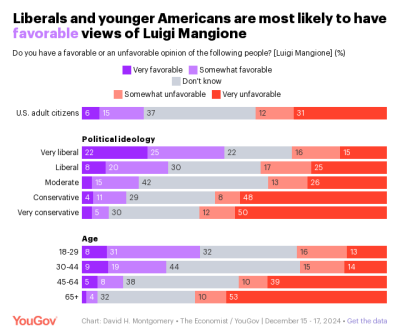
This graph helps illustrate the demographics of either group as well as the proportions of the U.$. population that fall into either side. We also must wonder if the 20% support for Luigi Mangione among Amerikans would translate to support for retribution for the killing of Robert Brooks by New York prison guards and the slow genocide of New Afrikan men in U.$. prisons? We probably all know the answer to this question.
Though there is a real ideological divide between the two aforementioned groups, it would be wrong to overstate the width of this divide. Both groups are merely two factions of the white supremacist Amerikkkan establishment which exploits the Third World in order to secure their own prosperity.
Our Thoughts
Where do we lie in this divide? You certainly won’t find us shedding tears over a dead CEO, disavowing violence, or proclaiming pacifism, but you also will not see us celebrating Luigi Mangione as some sort of hero of the oppressed. Instead, we view Luigi as merely the latest manifestation of labor aristocracy angst towards the imperialist leaders of the United $tates. If either of Luigi’s actions or political line were rooted in revolutionary politics, we’d be a bit more sympathetic to em. But as it stands, Luigi’s lone wolf killing is both tactically inept and ideologically confused.
More broadly, we understand the struggle of people in the United $tates for more comprehensive healthcare. But rather than trying to secure healthcare for Amerikans only, why don’t we set our sights on securing healthcare for all people? Why should we advocate for petty reforms like getting earlier colonoscopies for middle-aged Amerikans when millions die each year in the Third World from easily-preventable diseases because of imperialist wealth extraction? or when U.$. weapons are used to murder doctors and bomb hospitals in Gaza? This is a topic comrades have written on before in relation to the Affordable Care Act(3), and it clearly remains relevant today. Even if we limit our scope to be within U.$. borders, the lack of healthcare that’s available for prisoners is a much more pressing issue than the reforms which the social fascists are seeking. It’s well documented how healthcare, and lack thereof, is used as a tool to punish and torture prisoners(4) rather than being recognized as a constitutional right.
Circling back to the central topic of this article, the question still stands: will this shooting actually change anything about the healthcare industry? Almost certainly not. But it has provided an opportunity for the fascism of the labor aristocracy to rear its head in a particularly brazen fashion through the actions of Luigi Mangione. As the U.$. labor aristocracy is faced with political chaos both at-home and abroad, they will resist the ever-looming threat of proletarianization. Will they recover and maintain their position in the imperialist world system? Will the U.$. population come face-to-face with proletarianization as global inter-imperialist conflicts intensify? We cannot say which is the case. The only thing we are sure of is that the actions of Luigi Mangione have provided a unique insight into the political terrain we operate in within U.$. borders. As communists, we must harness this insight and use it to guide our political action so that we may empower the international proletariat in their struggle against capitalist-imperialism. The only path forward is revolution.
(1) Ken Klippenstein, 10 December 2024, Exclusive: Luigi’s Manifesto
(3)ULK 38, April 2014, Affordable Care Act Underscores Need for Global Health Coverage
(4)ULK 12, September 2009, Basic Healthcare Threat to Security





 Alabama
Alabama
 Alaska
Alaska
 Arizona
Arizona
 Arkansas
Arkansas
 Army Post
Army Post
 California
California
 Colorado
Colorado
 Connecticut
Connecticut
 Delaware
Delaware
 District of Columbia
District of Columbia
 Federal
Federal
 Florida
Florida
 Georgia
Georgia
 Guam
Guam
 Hawaii
Hawaii
 Idaho
Idaho
 Illinois
Illinois
 Indiana
Indiana
 Iowa
Iowa
 Kansas
Kansas
 Kentucky
Kentucky
 Louisiana
Louisiana
 Maine
Maine
 Maryland
Maryland
 Massachusetts
Massachusetts
 Michigan
Michigan
 Minnesota
Minnesota
 Mississippi
Mississippi
 Missouri
Missouri
 Montana
Montana
 Nebraska
Nebraska
 Nevada
Nevada
 New Hampshire
New Hampshire
 New Jersey
New Jersey
 New Mexico
New Mexico
 New York
New York
 North Carolina
North Carolina
 North Dakota
North Dakota
 Ohio
Ohio
 Oklahoma
Oklahoma
 Oregon
Oregon
 Pennsylvania
Pennsylvania
 Puerto Rico
Puerto Rico
 Rhode Island
Rhode Island
 South Carolina
South Carolina
 South Dakota
South Dakota
 Tennessee
Tennessee
 Texas
Texas
 Utah
Utah
 Vermont
Vermont
 Virginia
Virginia
 Washington
Washington
 West Virginia
West Virginia
 Wisconsin
Wisconsin
 Wyoming
Wyoming

